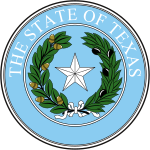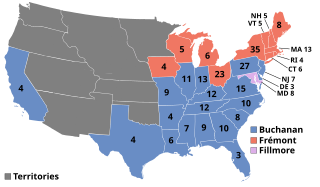
The 1856 United States presidential election was the 18th quadrennial presidential election, held on Tuesday, November 4, 1856. In a three-way election, Democrat James Buchanan defeated Republican nominee John C. Frémont and Know Nothing nominee Millard Fillmore. The main issue was the expansion of slavery as facilitated by the Kansas–Nebraska Act of 1854. Buchanan defeated President Franklin Pierce at the 1856 Democratic National Convention for the nomination. Pierce had become widely unpopular in the North because of his support for the pro-slavery faction in the ongoing civil war in territorial Kansas, and Buchanan, a former Secretary of State, had avoided the divisive debates over the Kansas–Nebraska Act by being in Europe as the Ambassador to the United Kingdom.
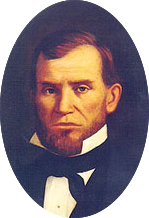
Hardin Richard Runnels was an American politician. He served as the sixth Governor of Texas for one term but notably was the only person to ever defeat Sam Houston in a political contest.

John Neely Johnson was an American lawyer and politician. He was elected as the fourth governor of California from 1856 to 1858, and later appointed justice to the Nevada Supreme Court from 1867 to 1871. As a member of the American Party, Johnson remains one of only three members of a third party to be elected to the California governorship.

Robert Allan Shivers was an American politician who served as the 37th governor of Texas. Shivers was a leader of the Texas Democratic Party during the turbulent 1940s and 1950s and developed the lieutenant governor's post into an extremely powerful perch in the state government.
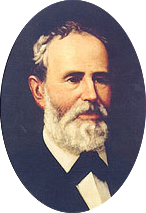
Elisha Marshall Pease was a Texas politician. He served as the fifth and 13th governor of Texas.

Joseph Albert Wright was the tenth governor of the U.S. state of Indiana from December 5, 1849, to January 12, 1857, most noted for his opposition to banking. His positions created a rift between him and the Indiana General Assembly who overrode all of his anti-banking vetoes. He responded by launching legal challenges to the acts, but was ruled against by the Indiana Supreme Court. The state's second constitutional convention was held during 1850–1851 in which the current Constitution of Indiana was drafted. He was a supporter of the new constitution and gave speeches around the state urging its adoption. He was opposed throughout his term by Senator Jesse D. Bright, the leader of the state Democratic Party.

Paul Octave Hébert was a soldier and politician who served as 14th Governor of Louisiana from 1853 to 1856. A veteran of the Mexican-American War, he later served as a brigadier general in the Confederate States Army.

The 1853 Texas gubernatorial election was held on August 1, 1853 to elect the governor of Texas.

David Catchings Dickson was an American politician and physician in early Texas who served as the ninth Speaker of the Texas House of Representatives and as the fourth Lieutenant Governor of Texas. He was also a State Senator and unsuccessfully ran for governor of Texas.

The Know Nothings were a nativist political movement in the United States in the 1850s, officially known as the Native American Party before 1855, and afterwards simply the American Party. Members of the movement were required to say "I know nothing" whenever they were asked about its specifics by outsiders, providing the group with its colloquial name.

The 1854 New York state election was held on November 7, 1854, to elect the governor, the lieutenant governor, a Canal Commissioner and an Inspector of State Prisons, as well as all members of the New York State Assembly.

The 1856 New York state election was held on November 4, 1856, to elect the governor, the lieutenant governor, a Canal Commissioner, an Inspector of State Prisons and the Clerk of the Court of Appeals, as well as all members of the New York State Assembly.

The 1860 New York state election was held on November 6, 1860, to elect the governor, the lieutenant governor, a Canal Commissioner, and an Inspector of State Prisons, as well as all members of the New York State Assembly. Besides, the question of Negro suffrage was asked, and was answered in the negative with 197,503 votes for and 337,984 against it.

The 1855 United States Senate election in New York was held on February 6, 1855, by the New York State Legislature to elect a U.S. Senator to represent the State of New York in the United States Senate.
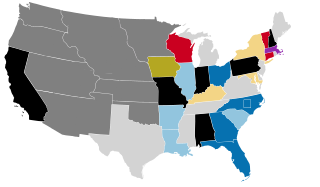
The 1854–55 United States Senate elections were held on various dates in various states. As these U.S. Senate elections were prior to the ratification of the Seventeenth Amendment in 1913, senators were chosen by state legislatures. Senators were elected over a wide range of time throughout 1854 and 1855, and a seat may have been filled months late or remained vacant due to legislative deadlock. In these elections, terms were up for the senators in Class 3.
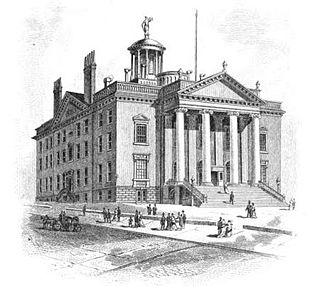
The 78th New York State Legislature, consisting of the New York State Senate and the New York State Assembly, met from January 2 to April 14, 1855, during the first year of Myron H. Clark's governorship, in Albany.

The All Progressives Congress (APC) is one of the two major contemporary political parties in Nigeria, along with the Peoples Democratic Party (PDP). Founded on 6 February 2013 from a merger of Nigeria's three largest opposition parties, the party came to power following the victory of party candidate Muhammadu Buhari in the 2015 presidential election. This marked the first time in Nigerian history that an opposition party unseated a governing party and power was transferred peacefully.

The 1857 Texas gubernatorial election was held on August 3, 1857, to elect the governor of Texas. The election pitted Lieutenant Governor Hardin Richard Runnels and Lieutenant Governor candidate Francis Lubbock against former President of the Republic of Texas Sam Houston and Lieutenant Governor hopeful Jesse Grimes. Runnels won the election with 57% of the vote, becoming the only person to ever defeat Sam Houston in a political contest.
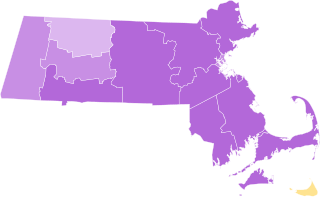
The 1854 Massachusetts gubernatorial election was held on November 15. American Party candidate Henry J. Gardner was elected to his first term as governor, defeating incumbent Whig Governor Emory Washburn.
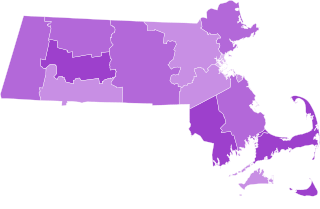
The 1856 Massachusetts gubernatorial election on November 4. Incumbent Know-Nothing Governor Henry J. Gardner was re-elected to a third term. He benefited greatly from a deal with the state's new Republican Party, which agreed not to field a candidate in exchange for Gardner's support of presidential nominee John C. Frémont. With no serious challenger in the field against him, Gardner easily defeated Democrat Erasmus Beach and George W. Gordon, an American Party member running in support of the national ticket.

